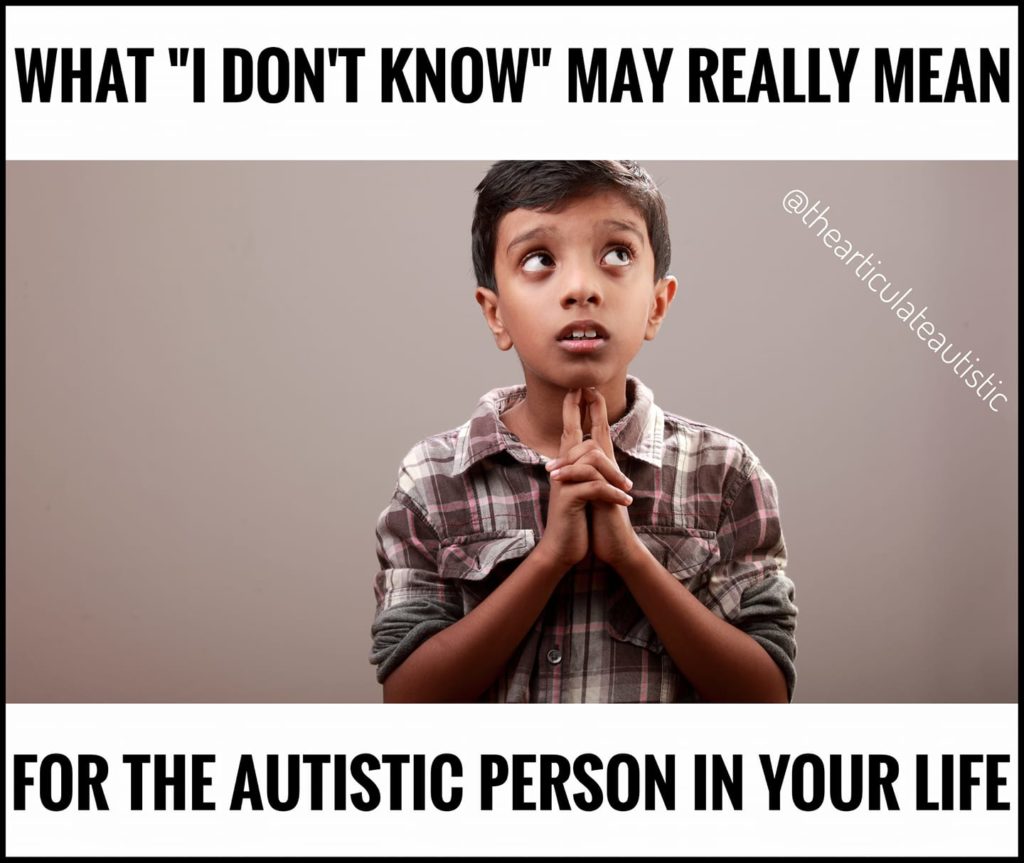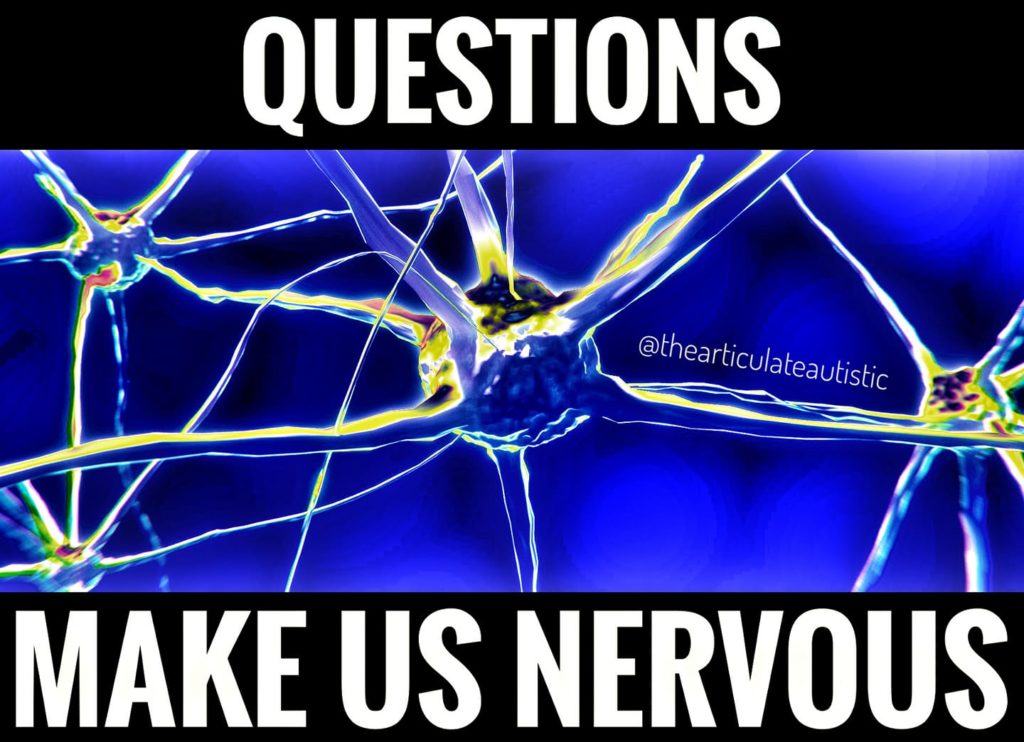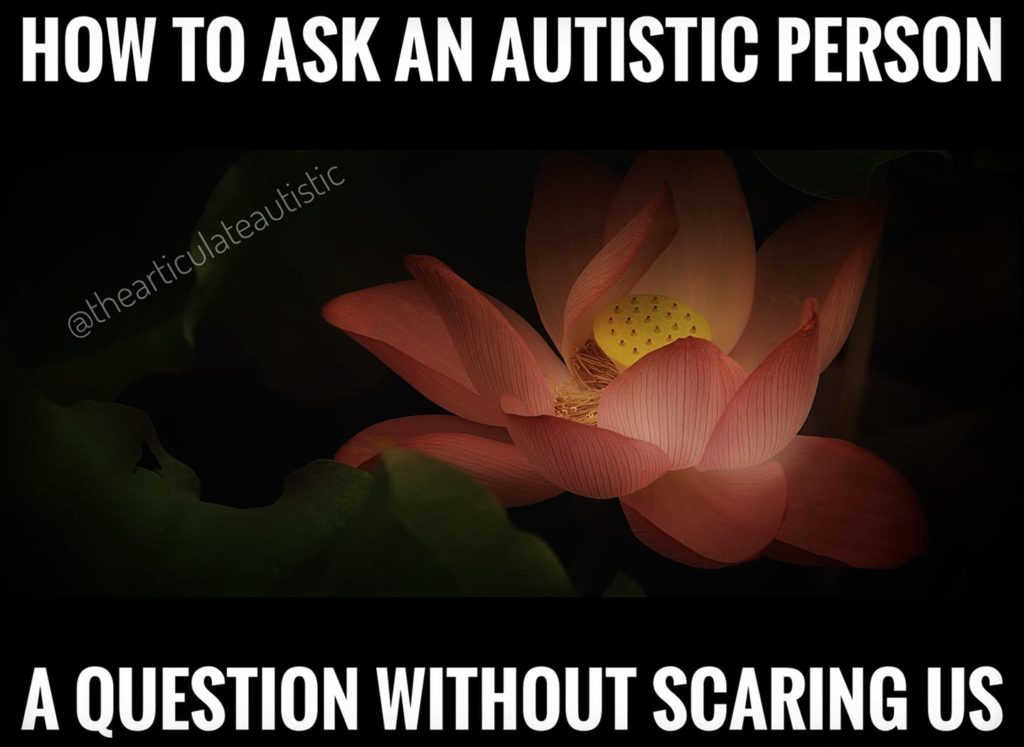What “I Don’t Know” May Really Mean for the Autistic Person in Your Life

“I don’t know.” If you hear that answer a LOT from the autistic person in your life, you definitely need to read this post.
When I was younger, especially when I was a child, I answered, “I don’t know” to many questions. Even if I technically may have “known”, and here’s why:
If someone asks me a question, I freeze. It’s not as bad as it used to be, but when I was a kid, questions triggered a PTSD response–(any question, you could have asked me about the weather).
For me, questions equaled, “I’m going to respond “wrong” somehow and be verbally or physically abused.”
Therefore, my brain would just shut down.
Also, and this is important, I often would not know how to answer a question. I had the images in my head, but I couldn’t form them into words and make them come out of my mouth.
I also (with cruel irony) wasn’t able to tell anyone about this fact until very recently.
This lead to a lot of “I don’t know” and shutting down and even melting down if pressed on the topic, which people then mistook as guilt or my trying to hide something, so they started interrogating me, and then I really lost it.
Here’s what “I don’t know” might translate to for your autistic loved one:
“I wasn’t prepared for a question. Now I can’t remember anything that happened today.”
“I’m way too busy masking to ensure my safety to be able to answer that question with any accuracy.”
“I honestly don’t remember even though it happened five minutes ago.”
“I have sensory overload, and I can’t process your question.”
“I didn’t hear you fully, but I’m afraid to ask you to repeat yourself.”
“I know the answer to your question, but I can’t explain it in words. I wish I could just ‘think’ it at you.”
Learn more about how questions might affect your autistic loved one and how you can address this concerns with them by clicking on the photos below.
Follow me on Instagram.
Want downloadable, PDF-format copies of these blog posts to print and use with your loved ones or small class? Click here to become a Patreon supporter!






Saving a link to this article for easy referrals 🙂
I’m glad you found it useful. 🙂
thanks for the post!
would you please explain how to support autistic teenagers who uses such responses to questions such as “how was your day?” “what did you eat for breakfast?”. I know the student know the answer for the question but keeps saying ” I do not know”. I am aware now why she is using such responses -thanks to your post-. But her family is really eager to listen how her day went..etc. how can I support her as her speech therapist?
Hi, May. Thank you for the question! It might simply be too overwhelming to ask the autistic teenager about their day, their breakfast, their lunch, etc. It may feel like they are being peppered with questions that can’t process and answer. I would suggest one question at a time, but if they can’t answer, they can’t answer. They’re unable, so the desire to know about their day will be something that may not be able to be satisfied. When inability clashes with desire, inability “wins” every time. Over time, the teen may learn to be able to answer these questions, or maybe answer them in a different format such as writing or taking pictures as they go through their day, but until a solution is found, the questions are just going to cause more stress. That might not have been the answer you’re looking for, but I hope it helped (at least a bit). Best of luck, and thank you for being neurodiversity-affirming in your practice!
My 7 year old with autism and adhd diagnosis says “I don’t know” to EVERYTHING. We used to ask how his day was, but almost never got a response. Now we rarely ask and instead we start by telling him about our day. It can be the most boring day ever (ie, today I sent some emails and had a meeting with my boss). We deliberately ask him zero questions. 9/10, this prompts him to tell us about his day.